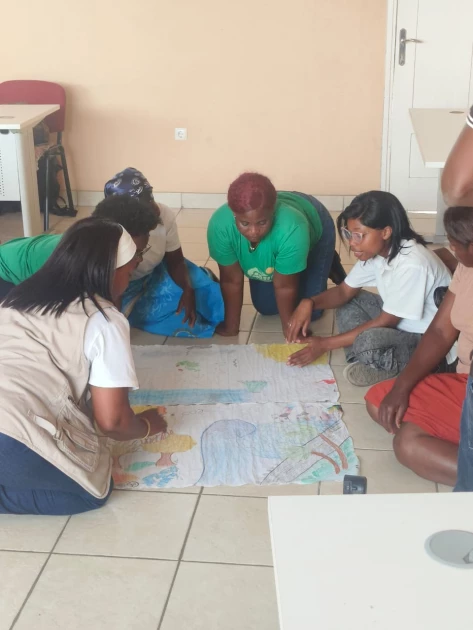Rising from the floods:The women turning climate crisis into opportunity in Mozambique

We join a Kenyan delegation on a documentation mission for grassroots climate action projects supported by the African Women’s Development and Communication Network (FEMNET), spotlighting women-led resilience efforts in communities hardest hit by climate change.

Audio By Vocalize
Today, it stands as a symbol of resilience amid the climate crisis sweeping across southern Africa.
We join a Kenyan delegation on a documentation mission for grassroots climate action projects supported by the African Women’s Development and Communication Network (FEMNET), spotlighting women-led resilience efforts in communities hardest hit by climate change.
As we approach Manhiça village, lush but untended tracts of land stretch before us — a stark reminder of what was once a thriving sugarcane belt.
Locals recall that until 2023, these fields were a cornerstone of the local economy, sustaining thousands through commercial sugarcane farming and employment at the nearby Maragra Sugar Factory.
But that changed when unprecedented rains lashed southern Mozambique in February 2023, submerging over 8,500 hectares of sugarcane fields.
The floodwaters drowned entire plantations, leaving behind stagnant pools now overrun by water plants — and livelihoods washed away.
Families that once depended on the sugar industry were forced to relocate to higher ground. Many men who worked in the fields or factory lost their only source of income. For most, recovery remains elusive.
In the heart of Manhiça, beneath the shade of a large tree, a group of women and girls sit in a circle, engrossed in discussion.
Nearby, an iron-sheet hall provides shelter from the searing sun — the venue for MULEIDE Cycle Classes, a community-led program offering climate change education and empowerment for women and youth.
Inside, 19-year-old Kelsa Nhambonga, a Grade 12 student, listens attentively. Her father, once a factory worker at Maragra, lost his job when the floods destroyed the cane fields.
“It has not been easy for our family since my father lost his job,” Kelsa says. “These classes have helped me understand how climate change affects us directly. I’ve realized this is not just a global issue — it’s personal.”
Maria José, Program Manager at MULEIDE Mozambique, explains that the Cycle Learning initiative was launched to create safe spaces for women and youth to share experiences, learn their rights, and strengthen resilience in the face of climate disasters.
“Manhiça was chosen because it’s one of the districts most affected by floods and erosion,” says José. “Through these cycles, communities build solidarity and advocate for inclusion in local decision-making on climate and development issues.”
In many rural Mozambican communities, traditional gender roles still define men as breadwinners and women as homemakers. But when the floods struck, women were forced to take on new responsibilities — not by choice, but by necessity.
“After the devastating floods, we mobilized local women’s groups to rebuild livelihoods and reduce vulnerability,” says José.
Just a few meters from the MULEIDE hall, a group of women work in a small demonstration farm — about half an acre of neatly fenced land. They are preparing soil for vegetable gardens, part of a training program that teaches home-based food security and small-scale agribusiness.
Among them is Isalifa Ismael, 36, who moved to Maputo province from Gaza in 2015 with her husband.
“I joined this group because women here need power and knowledge,” she says proudly. “This farm has changed my life. I no longer depend on my husband for food. I’ve planted mango trees and learned to make and sell mango juice. It’s my money — earned by my hands.”
For MULEIDE, the project’s success lies in connecting economic independence with climate resilience and gender equality. But challenges persist.
“Funding delays slow implementation,” José admits. “Many people still have limited awareness of climate change and gender issues. Cultural norms also restrict women’s participation in local decision-making. More funding, continuous training, and stronger partnerships with local authorities are crucial.”
Ann Tek, FEMNET’s Climate Justice Coordinator from Kenya, notes striking similarities between the two countries.
“Mozambican women, like those in Kenya, bear the brunt of climate injustices — from destroyed farms to giving birth under trees when floods wash away health facilities,” Tek says. “But Mozambique is on the right path. The government is beginning to engage with civil society, just as Kenya once did.”
According to the Assessment Capacities Project (ACAPS), heavy rains between 7–11 February 2023 caused widespread flooding across southern Mozambique, particularly in Maputo province.
More than 43,000 people were affected, with 16,500 displaced. The United Nations Office for the Coordination of Humanitarian Affairs (OCHA) reported that over 40,000 hectares of farmland were damaged — a devastating blow in a country where 70% of livelihoods depend on agriculture.
Mozambique remains one of the world’s most climate-vulnerable nations.
The Global Climate Risk Index ranks it among the 13 least prepared countries globally — a sobering reality for communities like Manhiça.


Leave a Comment